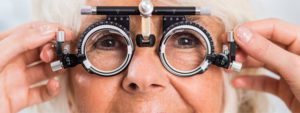 Low vision and blindness are common conditions in the elderly population; 6.5 million seniors over the age of 65 have some degree of age-related vision loss. And with this vision loss comes several of risk factors.
Low vision and blindness are common conditions in the elderly population; 6.5 million seniors over the age of 65 have some degree of age-related vision loss. And with this vision loss comes several of risk factors.
Vision loss and blindness can intensify the following risks and issues:
• Falls
• Bone fractures
• Needs private transportation
• Difficult with daily tasks
• Walking
• Moving around the home
• Bathing
• Medication management
• Eating
• Dressing
• Preparing meals
• Paying Bills
• Reading important documentation
• Security is jeopardized and more
There are multiple causes of vision loss and blindness; listed below are the most common and the symptoms and risks associated with each disorder.
Macular Degeneration
Age-related macular degeneration is the leading cause of blindness in adults over the age of 50. It is estimated that more than 10 million Americans have age-related macular degeneration (AMD), and unfortunately, there is still no cure for the disease. In AMD the portion of the retina responsible for our central vision, the macula, becomes damaged leading to a loss of vision, distortion or blind spots in central vision. Although it is a very complex disease and still not completely understood, it can be brought on by both hereditary and environmental factors.
Glaucoma
3 million Americans are suffering from a dangerous eye disorder that can rob them of their sight and nearly 1.5 million of them do not even know they have it. Glaucoma is referred as a “sneaky sight stealer” because, unfortunately, there are minimal symptoms associated with the disease and the miniscule indicators can cause up to 40% of permanent vision loss before the person notices any vision changes. Glaucoma is the second leading cause of blindness and usually affects the elderly.
Cataracts
According to the American Academy of Ophthalmology, Cataracts affect more than 24.4 million Americans age 40 and older, and by age 75, more than half of that demographic will have advanced cataracts.
The usual symptoms of cataracts are blurry vision, seeing double, sensitivity to light (both natural and synthetic), trouble with night vision, and irritated eyes. The lens of the eye that is affected is behind the iris (the colored area of the eye). This lens filters light through the eye into the retina, allowing signals of the images that we see to transmit to the brain. But with cataracts, the lens is cloudy and scatters the light, causing blurred vision. If left untreated, cataracts can cause blindness.
Diabetic Retinopathy
One in 10 Americans have diabetes, putting them at heightened risk for visual impairment due to the eye disease diabetic retinopathy. The disease also can lead to other blinding ocular complications if not treated in time. Fortunately, having a dilated eye exam yearly or more often can prevent 95 percent of diabetes-related vision loss.
At the Crossings at Hancock Creek, Many of their residents suffer from macular degeneration, glaucoma, and age-related blindness. The Crossings is attentive to their patients and resident’s needs, offering many assistive amenities and services including transportation for outings, assistance with getting around the facility comfortably, adaptive utensils, plate guards (clear) and therapy services to enhance or maintain a level of independence and dignity.
The Crossings at Hancock Creek is an assisted living and memory care community that has offered a variety of services at many different levels of assistance since 2016. Their community preserves the patients’ lifestyles and dignity with innovative care. They provide social and recreational programs and much more.
The Crossings at Hancock Creek offers medication management, on-site pharmacy service, quality care plans administered by a licensed nurse and a 24-hour personal care staff to ensure premier care for every patient. They also provide physical, occupational and speech therapy through several agencies. They have the compassion, experience, expertise, skills, and programs to provide the quality care that results in the best possible quality of life.
You’re Invited: Eye Health Speaker Program & Tour of the Facility | February 21st at 6:00pm
The Crossings at Hancock Creek
Please give them a call at (239) 217-5900 to RSVP, or to schedule a private tour to see for yourself just what makes The Crossings at Hancock Creek so special.
The Crossings at Hancock Creek
3501 Hancock Bridge Parkway
Fort Myers, Florida 33903
239-217-5900
saberhealth.com










